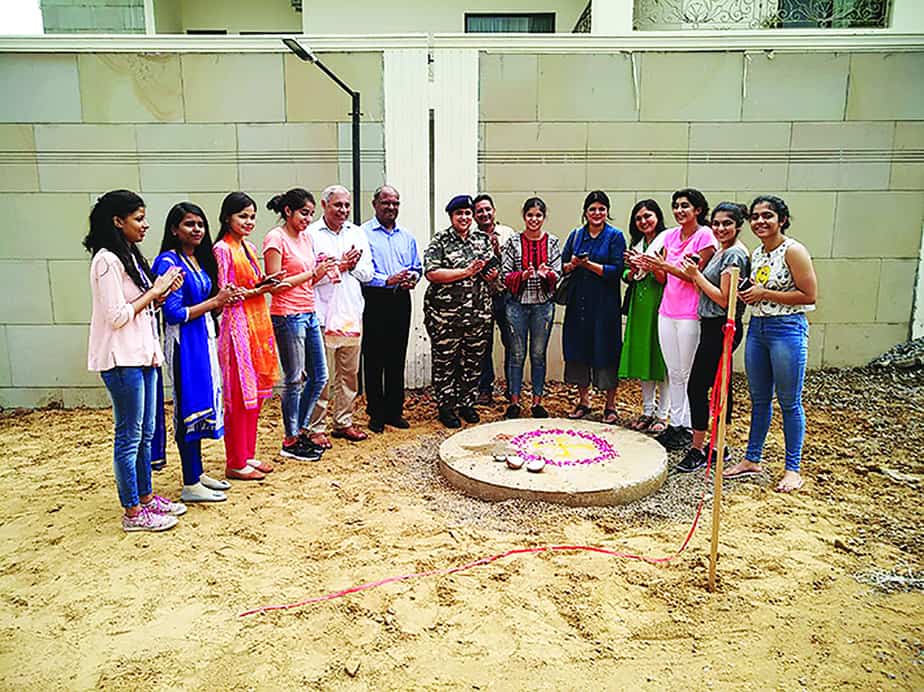Tavishi Singh, all of 15 years, has taken her place in the ranks of those working to make the world a better place for those less fortunate
Tavishi Singh, 15 years of age, began a rainwater harvesting drive in June 2018, an initiative she undertook in an effort to provide sustainable drinking water for the homeless and mentally and physically disabled, in association with the Earth Saviours Foundation. This is a Gurugram-based NGO that was founded about a decade ago by Ravi Kalra – it is dedicated to serving the less privileged, and protecting the environment. This Foundation presented the perfect launchpad for Tavishi’s efforts.
Tavishi felt that she needed to do something, however small, in order to make the lives of the underprivileged marginally easier. Her idea solidified on her trip to the Earth Saviours Foundation, where she was able to see a clearer picture of what the Delhi heat means for those without homes, and she became aware that drinking water could become a serious problem in the near future. She also observed the miserable conditions in which the Foundation’s beneficiaries used to live, plagued with allergies, open wounds and infections, with minimal or no access to food, water or shelter. The Foundation offered them not only food, shelter and medication, but also a sense of community and belonging. This sentiment called out to Tavishi strongly, and she ended up making the decision to create a rainwater harvesting system for them.
When Tavishi was trying to determine what kind of rainwater harvesting would be best suited for the community, she found herself confused by all the information that was coming her way — and this led her to cross paths with Sekhar Raghavan, the Rain Man of Chennai Raghavan, all the way from Chennai. helped Tavishi to find the most cost-effective and efficient way of rainwater harvesting, consistent with the requirements of the area where it was to be built.
Consequently two wells were built within the NGO premises, 20 ft deep, to replenish the water table.
Once the well is dug, boring is done, where pipes are inserted in the ground — these pipes facilitate the carrying of rainwater from the soil around the well, down to the water table. This way the water table keeps on getting replenished, allowing for flow of clean water.
The rainwater harvesting system once installed would have a three-fold effect: it would supplement the daily needs of 10,000 litres of water, replenish the fast depleting water tables, and eliminate the possibility of stagnant water bodies which could be a breeding ground for mosquitoes. “The criticality of water goes way beyond just basic hydration needs,” says Tavishi. We need enough clean water to drink, cook, bathe, wash – and not being able to access this resource spells out a severe lack of hygiene in the daily routine.
For this initiative, Tavishi’s fund-raising quest was two-pronged. She enlisted the help of the Ketto Foundation and also carried out door-to-door campaigning with the help of her friends. The funds she ultimately collected amounted to around Rs 1.78 lakh, of which Rs 1.2 lakh was utitlised for the building of the harvesting system. She plans on using the remaining funds, for future social work projects . “The NGO houses 500 people, which is why the process was a little expensive. If people were to make these alterations to their water systems at home, it would be very cheap and would make a huge difference.”
Her greatest encouragement? The support she got from her family, and those from all over the world who tried to contribute to her cause. “People all the way from the US to Singapore were contributing for my project, and that was really encouraging,” she smiles. Two other individuals she mentioned were Mani Shankar Mishra, a senior engineer who oversaw the construction of the wells, and was there at every step of the way; and Renuka
Mishra, a senior officer in Sashastra Seema Bal whose experience in water harvesting was invaluable to the process.
Despite being a part of a generation that is constantly labelled as narcissistic and self-involved, Tavishi and others like her are actively taking small but sure steps to make a change. “Our generation has a voice, and most of us also possess the means to make ourselves heard,” says she, “so besides remaining ignorant, nothing is really stopping us from taking the lead in pertinent issues and making our dreams come true. No matter how small the step, raising our collective voices can have an impact on society.”





